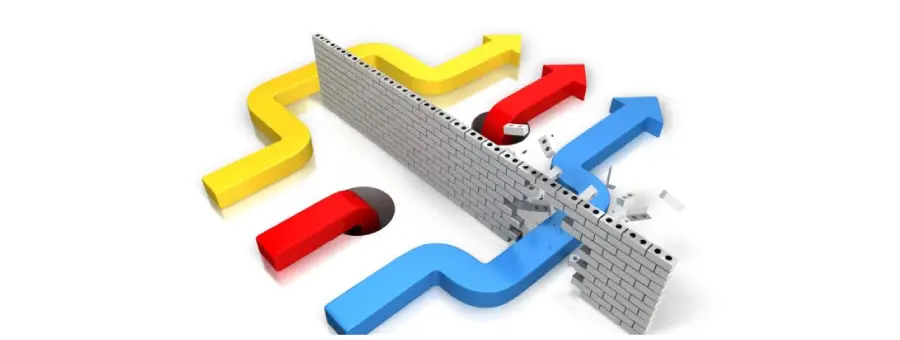
CATEGORIES: Coaching, Leadership, People and Performance
Everyone who runs a business wants their people to engage in high-level teamwork. The problem is quite a few people don’t always have the same desire or may not have the skills to carry it out. Barriers to teamwork either occur naturally or are artificially created by the organisation. Those that occur naturally need to be well managed and those that are artificially created need to be eradicated or at least managed down.
The following are naturally occurring barriers to teamwork:
- High performing people are not always good team players. Sometimes they will want to be the best (in the team) or they will want to stand out or the behaviours that have got them to where they are now have not always been team orientated. In any of those cases, they will not always want or be able to change those behaviours, for the sake of the team. Some of their individualistic behaviours should just not be tolerated but it’s also true that it can be counterproductive to try to get them to change everything. That can cause them to drop their overall performance and negatively impact team outcomes. So, as time-consuming or difficult as it may be, it has to be a case by case approach to high performing individuals and the same for each of their non-team behaviours. Such an investment into them is worth it in the long run. The very fact that they are high performers warrants individual coaching to get them to be even better in the team context. Such behaviours don’t necessarily come naturally to them and many of them have not had such training along the way.
- The competitive nature of (some) people can adversely affect their team orientation and this can be the case for anyone, not just high performers. In fact, it can be even worse if it’s a middle of the road performer whose competitive nature is limiting their contribution to teamwork, by wanting to be the best or wanting to win. The solution here is to re-orientate what or who the competition is with. The competition cannot be allowed to be against team members or other teams in the same organisation; it has to be against past overall results or competitors outside of the organisation. This re-orientation can be attained by a consistent training approach within.
- It’s an imperfect world and we all land where we are now according to a whole range of factors, so most teams have individuals with habits from the past that are counterproductive to teamwork. These have to be confronted and changed. It’s also a selection issue though where we may choose the proven team player (from any part of someone’s background) over someone who can not demonstrate that from their past.
- Some people just don’t know how to team. What does ‘teaming’ mean in behavioural terms? One of the biggest flaws in businesses is a distinct lack of training in this area, especially compared to the resources poured into leadership training. Teamwork tends to be an aspect of training that occurs inside some other ‘topic’ rather than being addressed with the emphasis it requires. Therefore, the skill sets, knowledge and decisions aren’t well enough addressed or trained to grow teamwork to the desired level. We have to train people in teamwork specifically and not just via team bonding activities which, whilst experiential, don’t always deliver the clarity of what’s required.
- Lack of commitment to self-sacrifice for the team is one of the biggest barriers to teamwork. First, people don’t actually understand nor therefore recognize that, to be a contributor to teamwork you have to give up some individual benefits to do so. It seems a bit silly to have to even say that but it’s a reality. So, first, every team has to ensure that all team members get that. Second, everyone has to consciously and explicitly commit to making self-sacrifices for the sake of the team, when necessary. And this conversation and recommitment has to be occur ongoing, including but not only when new people join the team. Self-sacrifice can mean anything from giving up the time to help a team member to train someone else even though it’s not part of the role, to giving advice, to forfeiting individual recognition for team achievement, to allowing others to perform desired roles, to doing positive things that go unnoticed by others.
- Personal dislike or like of others in the team. It’s obvious why the dislike of others in the team can hinder teamwork but the same can occur when people do like each other if they form cliques effectively exclude others. There is only one way to cut through this … have real conversations with those involved, not to chastise but to genuinely discuss the reality and the effects it’s having. Everyone has to be taken back to ‘why they are here’, why they work here, what their connections to the business are. Only when that’s genuinely understood will there be a commitment to the behaviours that are necessary to live out those motives. If those drivers are consistent with team behaviours, then that will help to solve the problem. Once people are clear on why they are there and the motives establish the necessity of teaming, then it’s easier to have the conversation about behaving for the team, irrespective or like or dislike of other individuals.
- If, however, people’s drivers/motives for being there are not consistent with teamwork, then a different, more fundamental problem exists and other questions have to be asked, including ultimately if each individual is right for the team. Businesses face attitudes of “it’s just work… why should I” so often that it’s clear we need to get better at creating engagement, not just employment. So, it’s critical to find out the genuine drivers of individuals for being there (or for wanting to be there when bringing in new people).
- The excuse of ‘I don’t have time’ … to engage teamwork .. is a copout. In fact, those words should never be used about anything. It’s always a matter of not making time, a deliberate choice, rather than accidentally not getting around to doing something. Teamwork is critical to success and not having time to engage it should be made unacceptable within every team. The longer-term benefits far outweigh the time that’s devoted to short-term behaviours.
- If those at the top (owners, key people) aren’t good at driving teamwork or participating in teamwork, it’s just about mission impossible for everyone else. Someone has to have the courage and initiative to point it out to them and if no one has that courage, then the team will remain stuck. Most often though people in their workplace will suffer in silence as they go about their daily work to play out what is partially a farce. Every individual has a choice what to do about that; it’s just a fact that many don’t realize, understand or choose to act on their available choices. (This paragraph is critical to teamwork and way more important than these few lines can cover).
- Teamwork that’s restricted to one team rather than across teams within the organisation will limit or hinder overall teamwork. It’s absurd for a sales team to not work in well with the marketing team or the I.T. team when they are absolutely critical to each other’s success. Or for the finance team to have little to do with the operations team. Cross teaming is crucial but is rarely addressed inside businesses.
The following are artificially created barriers to teamwork:
- Remuneration and reward systems that, in effect, discourage teamwork. For example, individual incentives are unlikely to generate teamwork and the worst of these is incentives provided to salespeople that are entirely based on individual results. What’s the likelihood that salespeople will then help others through sharing leads, sharing clients or even giving advice? Virtually nil. But it’s not just in sales we see such incentives. Some organisations have improved the situation by linking an individual to team performance in the provision of incentives (balanced scorecard type approach). It’s always argued that high performing individuals will lose interest, perform at a lower level or even leave if team incentives are put in place (as well) but that’s not necessarily the case if the recognition is set up to not ‘hurt’ the high performing individuals. This should be part of the design of the recognition program itself so it warrants careful consideration.
- When an organisation promotes from within based on individual performance and with little or no regard to someone’s contribution to team performance, then there’s an inbuilt factor that inadvertently discourages teamwork. Promotions should take account of people’s contributions to teamwork as well.
- Physical barriers to teamwork exist too often within businesses, as below. We should be removing some of these barriers, at least for some situations, not just going with the efficiencies of keeping teams together all of the time.
- Training and development sessions conducted by the same teams;
- Separate team meetings, most of the time;
- Teams housed in different parts of the premises;
- Groups set up to deal with problems or opportunities in their own functional areas ( (e.g. finance, I.T., sales, marketing, operations).
- The organisation chart itself is more often than not a barrier to teamwork. People are, by unwritten rules, discouraged from communicating beyond up or down one level, and across to colleagues. Anyone who goes two levels up or down is likely to be accused of usurping someone else’s authority. Even communicating across can step on people’s toes if not done carefully because ‘that’s not your area’. How can an organisation ever have effective teamwork when communication is underpinned by such a strong institutionalised set up like that, with negative ramifications sometimes for people who try to engage outside of the ‘lines’. Either the organisation chart should be changed to reflect the teamwork desired or the unwritten rules have to scrubbed and replaced with the articulated encouragement of wider communication.
- Competition between teams, whilst intending to encourage healthy competition, can also cause a lack of teamwork across teams. The setting up of internal competition between teams (intentionally or inadvertently) actually formalizes them not (always) cross teaming. Competition between different sales teams or between a service team and an operations team, for example, will not lead to them working well with the other team for overall results. Again, the recognition system should reward the total team, each team and individuals, to get the best of teamwork .. and that is possible to achieve providing enough thought, input and foresight are engaged in the design. It just takes a highly considered approach.
The reality is that a person can spend part of a day being a wonderful team player in one situation (e.g. family, friendship group or sport) yet be very poor at it in another (e.g. work). That demonstrates that the person has the skills but not the inclination. It’s a difficult inclination to change but it’s possible if worked on. Accepting poor teamwork, because of naturally occurring human tendencies or artificially created barriers is a nonsense. High performing organisations are taking different approaches, as are individuals, to remedy what has been true of the past. This article is recognizing the strong difficulty in doing so, but also the tremendous rewards to those who go there.
Previous Newsletter Articles
Contact Us
1300 022 270
enquiries@myabbs.com.au
Book An Appointment




